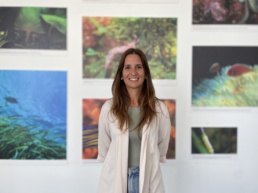The jury considered that the project from the researcher at Porto University “will change our global perception of the Atlantic”. The installation of more than 2000 sensors on 85 rocky beaches across the North Atlantic creates the world’s largest network for measuring sea temperature and biodiversity.
The Luso-American Development Foundation is pleased to announce that the winner of the 1st edition of the FLAD Science Award Atlantic is Rui Seabra, a researcher at CIBIO-InBIO from Porto University. The jury believes that the project “will change our global perception of the Atlantic”. Rui Seabra will receive 300 thousand euros of funding in three years, to study the impact of climate change on North Atlantic coastal biodiversity.
In a process with excellent applications, which according to the jury reveal the quality of Portuguese researchers, the choice fell on the project CCTBON – North Atlantic Coupled Coastal Temperature and Biodiversity Observation Network, by Rui Seabra.
The project involves the installation of more than 2000 sensors on 85 rocky beaches throughout the North Atlantic – from Guinea-Bissau to Norway and Ecuador to the Arctic, with Mainland Portugal and the Azores taking a special emphasis. This will set up a network for collecting sea temperature and biodiversity data, which will be the largest of its kind in the world.
“In addition to recognizing the quality of the scientific activity from researcher Rui Seabra, the award will improve knowledge about the influence of climate change on the ecosystems of tidal coastal zones. And, not least important, the award will allow Portugal to lead the collaboration between a significant number of researchers who, in different Atlantic regions (continental and island), develop works in favor of ocean sustainability.” – Elsa Henriques, administrator of FLAD.
The technology developed will allow access to the data collected by a network of sensors in a simple way, using contactless technology. The sensors will have a lifespan of more than 10 years, a substantial innovation compared to existing technology.
“It’s a project that looks at coastal areas across the North Atlantic, which are areas particularly affected by climate change, from a basin perspective. It’s ambitious, it’s interesting, it’s demanding, and it’s from an organizational point of view very complex to do. But we believe it will be one of the initiatives that will change our global perception of the Atlantic.” – Miguel Miranda, member of the jury, Professor at the Faculty of Sciences from Lisbon University and president of IPMA.
These sensors will measure the temperature of the water along the North Atlantic coast with a degree of accuracy that satellite technology currently does not have, allowing researchers to understand the impact of climate change on marine biodiversity.
“The results of the project will be important to define strategies to preserve the fauna and flora in this region. (…) I would like to leave a word of appreciation to all the other candidates who have put forward excellent propositions, which in fact demonstrates the high quality of scientific research that is done by young Portuguese researchers.” – Pedro Camanho, member of the jury and Professor at the Faculty of Engineering from Porto University.
The project will be developed in partnership with researchers Brian Helmuth of the Northeastern University in Boston, David S. Wethey of the University of South Carolina, and Enrique Montes of the University of South Florida.
About the award
Research about the Atlantic is essential to understand very diverse and multidisciplinary areas with an impact on the sustainability of our planet and our quality life, from the interaction between oceans, atmosphere, and space, to climate change and sustainability.
FLAD’s goal is to stimulate the development of technology and promote the new generation of Portuguese scientists. This award has a great focus on achieving practical results, such as the creation of engineering and technologies, that facilitate our understanding and exploitation of Atlantic ecosystems.
In addition, FLAD intends to provide support and distinguish researchers at the beginning of their careers, thus promoting the new and promising generation of researchers residing in Portugal, always with close collaboration with the main research groups in the USA.
Jury
The evaluation of the applications was made by a jury of excellence composed of three elements. The scientific committee, which is part of that same jury, consists of:
- Elsa Henriques, member of the Executive Council of the Luso-American Development Foundation and Professor at Instituto Superior Técnico;
- Miguel Miranda, Professor at the Faculty of Sciences, Lisbon University, and president of IPMA. Specialist in Geomagnetism, Marine Geophysics, and Natural Risks, with a special focus on Tsunamis;
- Pedro Camanho, Professor at the Faculty of Engineering, Porto University, president of LAETA and guest scientist at NASA. Specialist in Composite Materials and in the development of computational models for the design of Aerospace systems.
Related Posts
17 de February, 2025
Launch of the FLAD Rui Machete Award: 200 thousand euros to distinguish paths of excellence in the Portugal-USA relationship
The Award, worth 200 thousand euros,…
14 de January, 2025
New R&D@USA Scholarship Holders 1st semester 2025
FLAD has already selected candidates…
13 de December, 2024
Vânia Baptista, from the University of Algarve, wins FLAD Science Award Atlantic 2024
The project 'Finding Home – Discovering…


